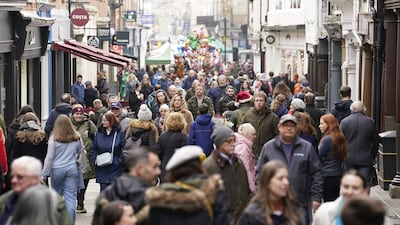UK retail sales in December soared by 6.5 per cent on a like-for-like basis, compared with a year earlier, but much of the increase was down to an 8 per cent rise in food price inflation, according to a survey by the British Retail Consortium and financial firm KPMG.
Total sales increased by 6.9 per cent in December against an increase of 2.1 per cent in December 2021. This is well above the three-month average growth of 4.4 per cent and the 12-month average growth of 3.1 per cent.
Nonetheless, the growth figures are below the overall rate of inflation in the UK, which although down slightly in December at 10.7 per cent, is still close to 40-year highs. That would indicate that sales volumes once again fell in December, for the ninth month in a row, as consumers buy less and seek cheaper alternatives where they can.
“The numbers for sales growth in December look healthy,” said Paul Martin, UK head of retail at KPMG. “This is largely due to goods costing more and masks the fact that the volume of goods that people are buying is significantly down on this time last year.”
BRC chief executive Helen Dickinson said: “After an exceptionally challenging year which saw inflation climb and consumer confidence plummet, the uptick in spending over Christmas gave many retailers cause for cheer.
“Retail faces further headwinds in 2023. Cost pressures show little immediate signs of waning, and consumer spending will be further constrained by increasing living costs.”

Trouble ahead
So far, Christmas seems to have been positive for many retailers, as customers chose to go out during a month that saw bitterly cold temperatures and industrial action, including rail strikes.
Footfall was up 15 per cent in December compared with a year earlier, and the clothing retailer Next raised its profit forecast, after full-price sales grew unexpectedly in the last weeks of 2022.
Further updates are due later this week from the supermarket chains Sainsbury's and Tesco, as well as the food and clothing retailer Marks & Spencer.
Nonetheless, analysts are warning that any New Year cheer could be short-lived, as UK consumers face mounting energy and mortgage costs and soaring inflation.
Yesterday the government announced a dramatic cut to the subsidies that have been helping retailers with their own energy costs.
“The strong demand across certain categories that has protected some retailers will undoubtedly fall away so we can expect high street casualties as we head into the spring. This will present opportunities and some organisations will benefit from the current situation through market-share growth and consolidation opportunities that will arise,” said Paul Martin at KPMG.
“The first half of the year will be tough for retail and a case of survival of the fittest, but we expect to see demand increase as 2023 progresses.”


